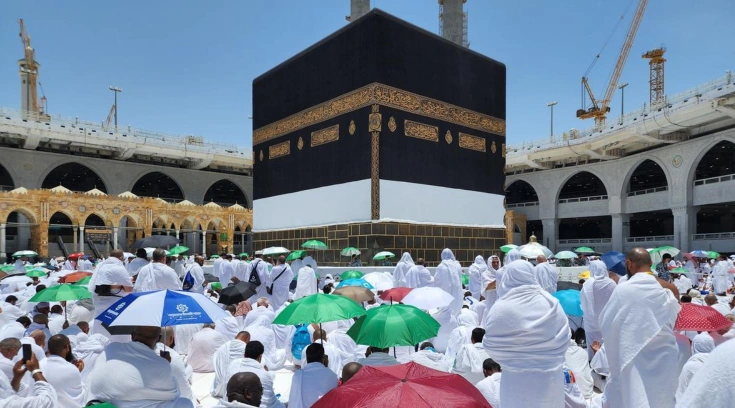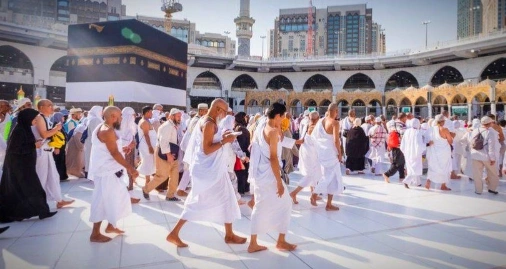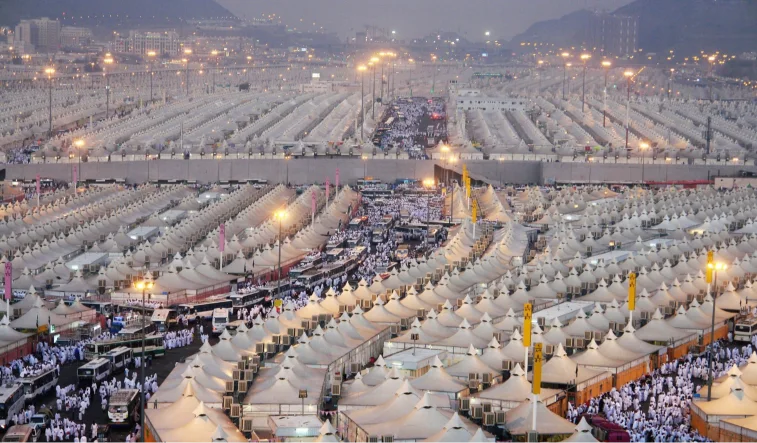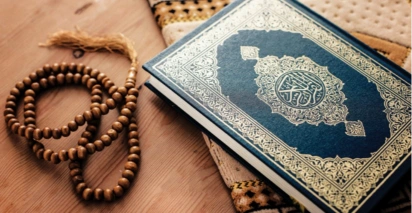What Is Hajj?
Hajj is a significant annual pilgrimage in Islam, Also, In Islamic terminology, Hajj refers to a pilgrimage to the Kaaba, known as the “House of Allah,” located in the holy city of Mecca, Saudi Arabia. It is considered one of the Five Pillars of the faith, which are essential acts of worship for Muslims. Every financially and physically capable Muslim must undertake this pilgrimage to Mecca at least once in their lifetime.

This spiritual journey consists of various rituals and acts of worship conducted in and around the holy city. The rituals of Hajj have remained consistent since their origin and are deeply embedded in Islamic history and traditions. The pilgrimage starts on the 8th of Dhu al-Hijjah, the final month of the Islamic lunar calendar, and lasts for about 5-6 days.
Moreover, The exact dates vary each year based on the lunar calendar. During Hajj, millions of Muslims from around the world come together to fulfill their religious duties and seek a closer connection with Allah.
The Importance of Hajj

1. Obligatory Act of Worship
Hajj is a fundamental religious duty. Every Muslim who is financially and physically able must perform it at least once in their lifetime. This obligation underscores the commitment and dedication of Muslims to Allah. It ensures that only those who can afford to go without causing undue hardship to their families undertake this pilgrimage.
2. Spiritual Cleansing and Forgiveness
The rituals of Hajj offer Muslims a chance to seek forgiveness for their past sins and start anew. Through the performance of these rituals, pilgrims aim to purify their souls and seek repentance, thereby strengthening their relationship with Allah. A sincere Hajj is believed to lead to the forgiveness of sins and spiritual renewal.
3. Unity and Equality
Hajj unites Muslims from various cultures, nationalities, and social backgrounds. During Hajj, all pilgrims wear simple white garments called Ihram, which eliminates visible distinctions of wealth, race, and social status. This uniformity symbolizes the unity and equality of all Muslims before Allah. Furthermore, It highlights the concept of universal brotherhood and sisterhood in Islam.
4. Following the Footsteps of Prophets
The rituals of Hajj have historical roots tracing back to the time of Prophet Ibrahim AS and his family. Moreover, It included his wife Hazrat Hajrah RA, and son Hazrat Ismail AS. Muslims reenact these historical events to honor the trials and faith of these significant figures. For instance, the Sa’i ritual involves walking between the hills of Safa and Marwah. However, this commemorates Hazrat Hajrah’s desperate search for water for her son Hazrat Ismail AS.

5. Commemorating the Submission of Prophet Ibrahim
Hajj also commemorates the willingness of Prophet Ibrahim AS to sacrifice his son Hazrat Ismail AS in an act of obedience to Allah’s command. This profound act of submission is celebrated during the festival of Eid al-Adha, which occurs at the end of Hajj. Muslims worldwide participate in the sacrifice of an animal during this festival. It also symbolizes their readiness to make sacrifices for Allah’s sake.
6. Spiritual Journey and Reflection
Hajj is a deeply transformative journey that encourages Muslims to detach from worldly concerns and focus on their spiritual development. The various rituals performed, such as circling the Kaaba, standing on the plains of Arafat, and stoning the pillars representing Satan, provide opportunities for introspection, repentance, and a closer connection with Allah.
7. Communal Worship and Supplication
Hajj is characterized by intense communal worship and supplication. Muslims gather in Mecca to perform rituals together, engage in collective prayers, and seek blessings from Allah. Moreover, This communal worship fosters a strong sense of unity and shared purpose among Muslims. Also, it reinforces their devotion and the bonds within the Muslim community.
Hajj in the Quran

Several verses in the Holy Quran guide performing Hajj and its Importance. Surah Al-Baqarah answers many questions about Hajj, detailing forbidden, allowed, and mandatory acts. Surah Al-Imran highlights the significance of Makkah as the first place of worship and mentions Prophet Ibrahim (AS). Other aspects of Hajj are discussed in Surahs Al-Maida, Al-Imran, Tawba, Al-Hajj, and Fath. Relevant verses on Hajj are shared below.
Surah Al-Baqarah:
وَإِذْ جَعَلْنَا ٱلْبَيْتَ مَثَابَةًۭ لِّلنَّاسِ وَأَمْنًۭا وَٱتَّخِذُوا۟ مِن مَّقَامِ إِبْرَٰهِـۧمَ مُصَلًّۭى ۖ وَعَهِدْنَآ إِلَىٰٓ إِبْرَٰهِـۧمَ وَإِسْمَـٰعِيلَ أَن طَهِّرَا بَيْتِىَ لِلطَّآئِفِينَ وَٱلْعَـٰكِفِينَ وَٱلرُّكَّعِ ٱلسُّجُودِ ١٢٥
And [mention] when We made the House a place of return for the people and [a place of] security. Including take, [O believers], from the standing place of Abraham a place of prayer. And We charged Abraham and Ishmael, [saying], “Purify My House for those who perform Tawaf and those who are staying [there] for worship and those who bow and prostrate [in prayer].” (2:125)
إِنَّ ٱلصَّفَا وَٱلْمَرْوَةَ مِن شَعَآئِرِ ٱللَّهِ ۖ فَمَنْ حَجَّ ٱلْبَيْتَ أَوِ ٱعْتَمَرَ فَلَا جُنَاحَ عَلَيْهِ أَن يَطَّوَّفَ بِهِمَا ۚ وَمَن تَطَوَّعَ خَيْرًۭا فَإِنَّ ٱللَّهَ شَاكِرٌ عَلِيمٌ ١٥٨
Indeed, as-Safa and al-Marwah are among the symbols of Allah. So whoever makes Hajj to the House or performs ‘umrah – there is no blame upon him for walking between them. And whoever volunteers well – then indeed, Allah is appreciative and Knowing. (2:158)
وَأَتِمُّوا۟ ٱلْحَجَّ وَٱلْعُمْرَةَ لِلَّهِ ۚ فَإِنْ أُحْصِرْتُمْ فَمَا ٱسْتَيْسَرَ مِنَ ٱلْهَدْىِ ۖ وَلَا تَحْلِقُوا۟ رُءُوسَكُمْ حَتَّىٰ يَبْلُغَ ٱلْهَدْىُ مَحِلَّهُۥ ۚ فَمَن كَانَ مِنكُم مَّرِيضًا أَوْ بِهِۦٓ أَذًۭى مِّن رَّأْسِهِۦ فَفِدْيَةٌۭ مِّن صِيَامٍ أَوْ صَدَقَةٍ أَوْ نُسُكٍۢ ۚ فَإِذَآ أَمِنتُمْ فَمَن تَمَتَّعَ بِٱلْعُمْرَةِ إِلَى ٱلْحَجِّ فَمَا ٱسْتَيْسَرَ مِنَ ٱلْهَدْىِ ۚ فَمَن لَّمْ يَجِدْ فَصِيَامُ ثَلَـٰثَةِ أَيَّامٍۢ فِى ٱلْحَجِّ وَسَبْعَةٍ إِذَا رَجَعْتُمْ ۗ تِلْكَ عَشَرَةٌۭ كَامِلَةٌۭ ۗ ذَٰلِكَ لِمَن لَّمْ يَكُنْ أَهْلُهُۥ حَاضِرِى ٱلْمَسْجِدِ ٱلْحَرَامِ ۚ وَٱتَّقُوا۟ ٱللَّهَ وَٱعْلَمُوٓا۟ أَنَّ ٱللَّهَ شَدِيدُ ٱلْعِقَابِ١٩٦
ٱلْحَجُّ أَشْهُرٌۭ مَّعْلُومَـٰتٌۭ ۚ فَمَن فَرَضَ فِيهِنَّ ٱلْحَجَّ فَلَا رَفَثَ وَلَا فُسُوقَ وَلَا جِدَالَ فِى ٱلْحَجِّ ۗ وَمَا تَفْعَلُوا۟ مِنْ خَيْرٍۢ يَعْلَمْهُ ٱللَّهُ ۗ وَتَزَوَّدُوا۟ فَإِنَّ خَيْرَ ٱلزَّادِ ٱلتَّقْوَىٰ ۚ وَٱتَّقُونِ يَـٰٓأُو۟لِى ٱلْأَلْبَـٰبِ ١٩٧
Hajj is [during] well-known months, so whoever has made Hajj obligatory upon himself therein [by entering the state of ihram], there is [to be for him] no sexual relations and no disobedience and no disputing during Hajj. And whatever good you do – Allah knows it. Including take provisions, but indeed, the best provision is fear of Allah. And fear Me, O you of understanding. (2:197)
Surah Al-Imraan:
إِنَّ أَوَّلَ بَيْتٍۢ وُضِعَ لِلنَّاسِ لَلَّذِى بِبَكَّةَ مُبَارَكًۭا وَهُدًۭى لِّلْعَـٰلَمِينَ ٩٦
Indeed, the first House [of worship] established for mankind was that at Makkah – blessed and a guidance for the worlds. (3:96)
فِيهِ ءَايَـٰتٌۢ بَيِّنَـٰتٌۭ مَّقَامُ إِبْرَٰهِيمَ ۖ وَمَن دَخَلَهُۥ كَانَ ءَامِنًۭا ۗ وَلِلَّهِ عَلَى ٱلنَّاسِ حِجُّ ٱلْبَيْتِ مَنِ ٱسْتَطَاعَ إِلَيْهِ سَبِيلًۭا ۚ وَمَن كَفَرَ فَإِنَّ ٱللَّهَ غَنِىٌّ عَنِ ٱلْعَـٰلَمِينَ ٩٧
In it are clear signs [such as] the standing place of Abraham. And whoever enters it shall be safe. And [due] to Allah from the people is a pilgrimage to the House – for whoever can find a way. But whoever disbelieves – then indeed, Allah is free from need of the worlds. (3:97)
Surah Al-Maida:
يَـٰٓأَيُّهَا ٱلَّذِينَ ءَامَنُوٓا۟ أَوْفُوا۟ بِٱلْعُقُودِ ۚ أُحِلَّتْ لَكُم بَهِيمَةُ ٱلْأَنْعَـٰمِ إِلَّا مَا يُتْلَىٰ عَلَيْكُمْ غَيْرَ مُحِلِّى ٱلصَّيْدِ وَأَنتُمْ حُرُمٌ ۗ إِنَّ ٱللَّهَ يَحْكُمُ مَا يُرِيدُ ١
O you who have believed, fulfill [all] contracts. Lawful for you are the animals of grazing livestock except for that which is recited to you [in this Qur’an] – hunting not being permitted while you are in the state of Ihram. Indeed, Allah ordains what He intends. (5:1)
يَـٰٓأَيُّهَا ٱلَّذِينَ ءَامَنُوا۟ لَا تُحِلُّوا۟ شَعَـٰٓئِرَ ٱللَّهِ وَلَا ٱلشَّهْرَ ٱلْحَرَامَ وَلَا ٱلْهَدْىَ وَلَا ٱلْقَلَـٰٓئِدَ وَلَآ ءَآمِّينَ ٱلْبَيْتَ ٱلْحَرَامَ يَبْتَغُونَ فَضْلًۭا مِّن رَّبِّهِمْ وَرِضْوَٰنًۭا ۚ وَإِذَا حَلَلْتُمْ فَٱصْطَادُوا۟ ۚ وَلَا يَجْرِمَنَّكُمْ شَنَـَٔانُ قَوْمٍ أَن صَدُّوكُمْ عَنِ ٱلْمَسْجِدِ ٱلْحَرَامِ أَن تَعْتَدُوا۟ ۘ وَتَعَاوَنُوا۟ عَلَى ٱلْبِرِّ وَٱلتَّقْوَىٰ ۖ وَلَا تَعَاوَنُوا۟ عَلَى ٱلْإِثْمِ وَٱلْعُدْوَٰنِ ۚ وَٱتَّقُوا۟ ٱللَّهَ ۖ إِنَّ ٱللَّهَ شَدِيدُ ٱلْعِقَابِ ٢
O you who have believed, do not violate the rites of Allah or [the sanctity of] the sacred month or [neglect the marking of] the sacrificial animals and garlanding [them] or [violate the safety of] those coming to the Sacred House seeking bounty from their Lord and [His] approval. But when you come out of ihram, then [you may] hunt. And do not let the hatred of a people for having obstructed you from al-Masjid al-Haram lead you to transgress, and cooperate in righteousness and piety, but do not cooperate in sin and aggression. And fear Allah; indeed, Allah is severe in penalty. (5:2)
يَـٰٓأَيُّهَا ٱلَّذِينَ ءَامَنُوا۟ لَا تَقْتُلُوا۟ ٱلصَّيْدَ وَأَنتُمْ حُرُمٌۭ ۚ وَمَن قَتَلَهُۥ مِنكُم مُّتَعَمِّدًۭا فَجَزَآءٌۭ مِّثْلُ مَا قَتَلَ مِنَ ٱلنَّعَمِ يَحْكُمُ بِهِۦ ذَوَا عَدْلٍۢ مِّنكُمْ هَدْيًۢا بَـٰلِغَ ٱلْكَعْبَةِ أَوْ كَفَّـٰرَةٌۭ طَعَامُ مَسَـٰكِينَ أَوْ عَدْلُ ذَٰلِكَ صِيَامًۭا لِّيَذُوقَ وَبَالَ أَمْرِهِۦ ۗ عَفَا ٱللَّهُ عَمَّا سَلَفَ ۚ وَمَنْ عَادَ فَيَنتَقِمُ ٱللَّهُ مِنْهُ ۗ وَٱللَّهُ عَزِيزٌۭ ذُو ٱنتِقَامٍ ٩٥
O you who have believed, do not kill game while you are in the state of Ihram. And whoever of you kills it intentionally – the penalty is an equivalent from sacrificial animals to what he killed, as judged by two just men among you as an offering [to Allah] delivered to the Ka’bah or an expiation: the feeding of needy people or the equivalent of that in fasting, that he may taste the consequence of his deed. Allah has pardoned what is past; but whoever returns [to violation], then Allah will take retribution from him. And Allah is Exalted in Might and Owner of Retribution. (5:95)
Surah Al-Tawba:
فَسِيحُوا۟ فِى ٱلْأَرْضِ أَرْبَعَةَ أَشْهُرٍۢ وَٱعْلَمُوٓا۟ أَنَّكُمْ غَيْرُ مُعْجِزِى ٱللَّهِ ۙ وَأَنَّ ٱللَّهَ مُخْزِى ٱلْكَـٰفِرِينَ ٢
So travel freely, [O disbelievers], throughout the land [during] four months but know that you cannot cause failure to Allah and that Allah will disgrace the disbelievers. (9:2)
إِنَّ عِدَّةَ ٱلشُّهُورِ عِندَ ٱللَّهِ ٱثْنَا عَشَرَ شَهْرًۭا فِى كِتَـٰبِ ٱللَّهِ يَوْمَ خَلَقَ ٱلسَّمَـٰوَٰتِ وَٱلْأَرْضَ مِنْهَآ أَرْبَعَةٌ حُرُمٌۭ ۚ ذَٰلِكَ ٱلدِّينُ ٱلْقَيِّمُ ۚ فَلَا تَظْلِمُوا۟ فِيهِنَّ أَنفُسَكُمْ ۚ وَقَـٰتِلُوا۟ ٱلْمُشْرِكِينَ كَآفَّةًۭ كَمَا يُقَـٰتِلُونَكُمْ كَآفَّةًۭ ۚ وَٱعْلَمُوٓا۟ أَنَّ ٱللَّهَ مَعَ ٱلْمُتَّقِينَ ٣٦
Indeed, the number of months with Allah is twelve [lunar] months in the register of Allah [from] the day He created the heavens and the earth; of these, four are sacred. That is the correct religion, so do not wrong yourselves during them. And fight against the disbelievers collectively as they fight against you collectively. And know that Allah is with the righteous [who fear Him]. (9:36)
إِنَّمَا ٱلنَّسِىٓءُ زِيَادَةٌۭ فِى ٱلْكُفْرِ ۖ يُضَلُّ بِهِ ٱلَّذِينَ كَفَرُوا۟ يُحِلُّونَهُۥ عَامًۭا وَيُحَرِّمُونَهُۥ عَامًۭا لِّيُوَاطِـُٔوا۟ عِدَّةَ مَا حَرَّمَ ٱللَّهُ فَيُحِلُّوا۟ مَا حَرَّمَ ٱللَّهُ ۚ زُيِّنَ لَهُمْ سُوٓءُ أَعْمَـٰلِهِمْ ۗ وَٱللَّهُ لَا يَهْدِى ٱلْقَوْمَ ٱلْكَـٰفِرِينَ ٣٧
Indeed, the postponing [of restriction within sacred months] is an increase in disbelief by which those who have disbelieved are led [further] astray. They make it lawful one year and unlawful another year to correspond to the number made unlawful by Allah and [thus] make lawful what Allah has made unlawful. Made pleasing to them is the evil of their deeds, and Allah does not guide the disbelieving people. (9:37)
Surah Al-Hajj:
وَأَذِّن فِى ٱلنَّاسِ بِٱلْحَجِّ يَأْتُوكَ رِجَالًۭا وَعَلَىٰ كُلِّ ضَامِرٍۢ يَأْتِينَ مِن كُلِّ فَجٍّ عَمِيقٍۢ ٢٧
And proclaim to the people the Hajj [pilgrimage]; they will come to you on foot and every lean camel; they will come from every distant pass. (22:27)
وَإِذْ بَوَّأْنَا لِإِبْرَٰهِيمَ مَكَانَ ٱلْبَيْتِ أَن لَّا تُشْرِكْ بِى شَيْـًۭٔا وَطَهِّرْ بَيْتِىَ لِلطَّآئِفِينَ وَٱلْقَآئِمِينَ وَٱلرُّكَّعِ ٱلسُّجُودِ ٢٦
And [mention, O Muhammad], when We designated for Abraham the site of the House, [saying], “Do not associate anything with Me and purify My House for those who perform Tawaf and those who stand [in prayer] and those who bow and prostrate. (22:26)
لِّيَشْهَدُوا۟ مَنَـٰفِعَ لَهُمْ وَيَذْكُرُوا۟ ٱسْمَ ٱللَّهِ فِىٓ أَيَّامٍۢ مَّعْلُومَـٰتٍ عَلَىٰ مَا رَزَقَهُم مِّنۢ بَهِيمَةِ ٱلْأَنْعَـٰمِ ۖ فَكُلُوا۟ مِنْهَا وَأَطْعِمُوا۟ ٱلْبَآئِسَ ٱلْفَقِيرَ ٢٨
That they may witness benefits for themselves and mention the name of Allah on known days over what He has provided for them of [sacrificial] animals. So eat of them and feed the miserable and poor. (22:28)
ثُمَّ لْيَقْضُوا۟ تَفَثَهُمْ وَلْيُوفُوا۟ نُذُورَهُمْ وَلْيَطَّوَّفُوا۟ بِٱلْبَيْتِ ٱلْعَتِيقِ ٢٩
Then let them end their untidiness and fulfill their vows and perform Tawaf around the ancient House. (22:29)
لَكُمْ فِيهَا مَنَـٰفِعُ إِلَىٰٓ أَجَلٍۢ مُّسَمًّۭى ثُمَّ مَحِلُّهَآ إِلَى ٱلْبَيْتِ ٱلْعَتِيقِ ٣٣
For you the animals marked for sacrifice are benefits for a specified term; then their place of sacrifice is at the ancient House. (22:33)
Al-Fath:
لَّقَدْ صَدَقَ ٱللَّهُ رَسُولَهُ ٱلرُّءْيَا بِٱلْحَقِّ ۖ لَتَدْخُلُنَّ ٱلْمَسْجِدَ ٱلْحَرَامَ إِن شَآءَ ٱللَّهُ ءَامِنِينَ مُحَلِّقِينَ رُءُوسَكُمْ وَمُقَصِّرِينَ لَا تَخَافُونَ ۖ فَعَلِمَ مَا لَمْ تَعْلَمُوا۟ فَجَعَلَ مِن دُونِ ذَٰلِكَ فَتْحًۭا قَرِيبًا ٢٧
Certainly, has Allah shown His Messenger the vision in truth. You will surely enter al-Masjid al-Haram, if Allah wills, in safety, with your heads shaved and [hair] shortened, not fearing [anyone]. He knew what you did not know and has arranged before that a conquest near [at hand]. (48:27)
Hajj in the Hadith
- Prophet Muhammad (PBUH), on acknowledging Hajj as a pillar of Islam, said, “Islam is based on five fundamentals: to proclaim that there is no god but Allah and Muhammad (PBUH’s) is the Messenger of Allah, and to establish the prayer, and pay Zakat, to offer pilgrimage of the House [of God] and to fast during Ramadan.” (Sahih Bukhari, No: 7)
- “Anyone that performs Hajj for Allah’s pleasure and avoids all forms of sin will return free from all sins, similar to as he was on his birthday.” (Sahih Bukhari and Muslim)
Read Also
What Is Tajweed? Benefits, Importance, & Reward
Final Words
Hajj serves as a unifying force in Islam. Also, brings Muslims from different parts of the world together in a shared spiritual experience. It is a time of reflection, repentance, and renewal of faith. Through the performance of Hajj, Muslims seek to strengthen their relationship with Allah and purify their souls. Additionally, they aim to foster a sense of unity and equality among believers.
FAQ’s
Is Hajj only for Muslims?
Yes, Hajj is specifically for Muslims. It is an obligatory act of worship for Muslims who are physically and financially capable of making the pilgrimage. While Muslims from diverse backgrounds and nationalities participate in Hajj, it is a religious duty that is exclusive to followers of Islam.
Is Hajj longer than Umrah?
Yes, Hajj typically lasts longer than Umrah, taking around 4 to 5 days to complete, while Umrah can range from a few hours to a week. Hajj includes additional rituals like visiting Mina, Arafah, and Muzdalifah, Stoning of the Devil, and spending Eid al-Adha in Makkah. Umrah involves Tawaf and Sa’i. Hajj is restricted to the month of Dhul Hijjah, whereas Umrah can be performed at any time.
What is female haji called?
A female haji is called a Hajjah or Hajah (حجة). This title is given to Muslim women who have completed the Hajj pilgrimage to Mecca.

